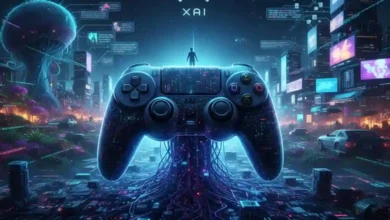Electronic Arts To Leverage AI For Cost Cutting

The news reverberated through the gaming world like a perfectly executed headshot: Electronic Arts, the titan behind franchises like FIFA, The Sims, and Apex Legends, has new owners. But this isn’t just another corporate reshuffle. Whispers from within confirm a strategic directive that will send shivers down the spines of many – a comprehensive plan to leverage advanced AI across the entire business, primarily to drastically cut costs. This isn’t just about streamlining; it’s a seismic shift, and its implications for the broader entertainment sector are profound, signaling a future where pixels and profits are increasingly generated by algorithms.
EA’s Bold New AI Frontier: Where Every Pixel Counts (and Costs Less)
Imagine a world where game development, marketing, and even customer service are largely autonomous. This is the future EA’s new owners envision. Here’s a breakdown of where AI is poised to revolutionize their operations:
- Generative AI in Game Development: Forget months of painstaking work by teams of artists and level designers. AI can now rapidly generate environments, character models, textures, and even entire game levels with remarkable fidelity and consistency.
- Automated Asset Creation: From foliage and rock formations to entire urban landscapes, AI will be tasked with generating a vast library of in-game assets, significantly reducing the need for large art teams. Imagine an AI learning the artistic style of a game and then producing endless variations of props and environmental details.
- Procedural Content Generation on Steroids: While procedural generation isn’t new, AI elevates it to an art form. It can learn player preferences, optimize level layouts for engagement, and even dynamically adjust difficulty in real-time. This means fewer human designers needed for initial world-building.
- NPC Behavior & Dialogue: AI-driven NPCs will move beyond pre-scripted routines. We’re talking about sophisticated AI that can learn player strategies, adapt their tactics, and even generate contextually relevant dialogue, making human writers and AI programmers potentially redundant in certain areas.
- Hyper-Personalized Marketing & Live Services: EA’s strength lies in its live service games. AI will supercharge this.
- Predictive Analytics for Player Churn: AI can identify players at risk of leaving a game and trigger targeted, personalized interventions (e.g., unique in-game offers, content recommendations) to retain them.
- Automated Content Tailoring: Imagine FIFA presenting you with news articles and challenges based on your favorite team, or The Sims suggesting new expansion packs based on your past gameplay habits – all curated by AI.
- Dynamic Pricing & Microtransactions: AI algorithms can analyze market demand, player spending habits, and in-game economies to dynamically adjust prices for virtual goods, maximizing revenue.
- Customer Service & Quality Assurance:
- AI Chatbots & Virtual Assistants: First-line customer support will be handled almost entirely by sophisticated AI, capable of resolving common issues, providing troubleshooting, and guiding players through FAQs. Human intervention will be reserved for complex, edge-case scenarios.
- Automated Bug Detection & Testing: AI can play through thousands of hours of gameplay, identifying glitches, exploits, and balance issues far faster and more thoroughly than human testers. This will drastically reduce QA team sizes.
The Domino Effect: How EA’s Move Will Reshape Entertainment
EA’s aggressive push into AI isn’t an isolated incident; it’s a bellwether for the entire entertainment industry. The ramifications for video gaming companies, movie studios, and even music production are immense.
- Video Gaming: The Race to Automate:
- Smaller, More Agile Development Teams: Studios that embrace AI will be able to produce more content with fewer traditional roles. This could lead to a wave of consolidation or the rise of highly specialized, AI-powered indie studios.
- The Rise of the “Prompt Engineer” & AI Supervisor: New job roles will emerge, focusing on guiding and refining AI models. The ability to effectively “talk” to AI and direct its creative output will be a highly sought-after skill.
- Increased Content Velocity: Games could receive updates, new features, and even entirely new game modes at an unprecedented pace, all facilitated by AI-driven development. This could lead to an “always-on” content cycle, pushing player engagement to new limits.
- Ethical Concerns & “Soulless” Content: A major debate will ignite around the artistic merit of AI-generated content. Will games lose their “soul” if human creativity is sidelined? What are the intellectual property implications when AI “learns” from existing art?
- Movie Studios: From Script to Screen, Powered by AI:
- AI Scriptwriting & Storyboarding: AI is already capable of generating compelling narratives. Imagine AI-assisted screenwriting that suggests plot twists, character arcs, and even dialogue based on successful past films.
- Virtual Sets & Digital Actors: The cost of physical sets and location shooting could plummet. AI can create highly realistic virtual environments, and advancements in digital human technology could see “AI actors” taking on non-lead roles, reducing casting and salary costs.
- Automated Visual Effects: The laborious process of VFX will be significantly accelerated. AI can generate realistic explosions, crowd simulations, and complex digital effects with minimal human oversight.
- Personalized Endings & Interactive Cinema: Imagine an AI-driven movie that subtly alters its narrative or ending based on your viewing history and preferences. This blurs the line between film and interactive entertainment.
- Music & Beyond:
- AI Composition & Production: AI can compose original scores, generate backing tracks, and even master audio, challenging traditional roles of composers, producers, and sound engineers.
- Personalized Music Streams: AI will curate incredibly precise playlists, potentially even generating bespoke music tailored to a listener’s mood or activity.
- Broad Implications for Content Creators: From YouTubers to independent artists, the tools of creation are becoming democratized and automated. The differentiator will shift from technical skill to imaginative prompting and curation.
The Human Element: Adaptation or Obsolescence?
This AI revolution, spearheaded by industry giants like EA, presents a stark choice for creative professionals. The skills that were once highly valued – intricate modeling, meticulous texture work, even basic coding – are increasingly being absorbed by intelligent algorithms.
- Upskilling is Paramount: Those who adapt by learning AI tools, understanding machine learning pipelines, and mastering prompt engineering will thrive. The focus shifts from executing tasks to directing intelligence.
- The Value of Uniqueness: Human creativity, particularly in its most innovative and unpredictable forms, will become even more precious. Stories, characters, and artistic visions that AI cannot yet replicate will be at a premium.
- Ethical Considerations & Job Displacement: The transition will undoubtedly lead to significant job displacement in traditional creative and operational roles. Societies will grapple with the economic and social impact, potentially leading to calls for universal basic income or robust retraining programs.
Conclusion: A New Era of Entertainment
EA’s new ownership isn’t just cutting costs; they’re laying the groundwork for an entirely new paradigm in entertainment. The rapid advancements in AI are transforming how content is created, marketed, and consumed. While the allure of efficiency and unprecedented content velocity is undeniable, the journey ahead is fraught with ethical dilemmas, economic disruption, and fundamental questions about the nature of creativity itself.
One thing is certain: the future of entertainment will be a fascinating, AI-powered frontier. The companies that learn to harness this power most effectively, while also navigating its complex challenges, will be the ones that define the next generation of digital experiences. The rest may find themselves relegated to the history books, outmaneuvered by algorithms and automated dreams.
For more Odinozz gaming articles, click here.
Follow Odinozz on social media. Click here.



